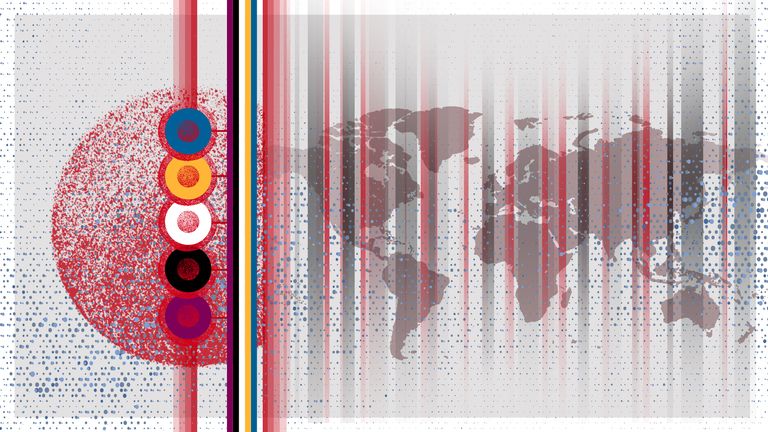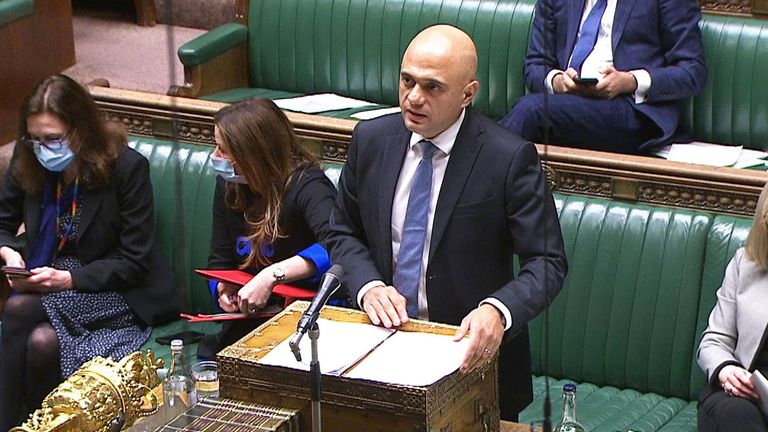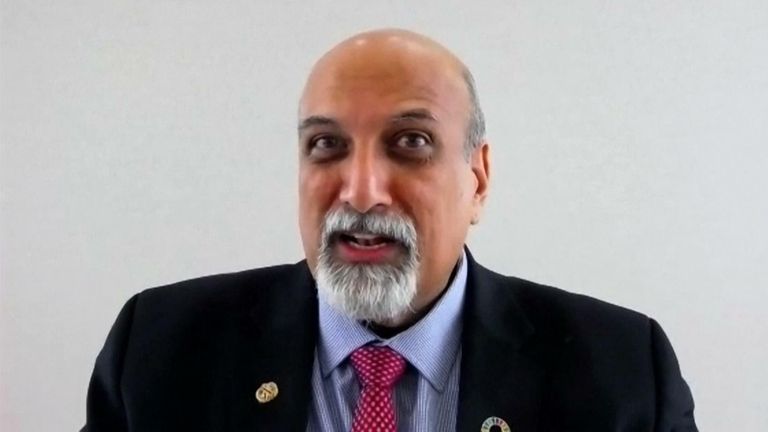COVID-19: Omicron variant may transmit more through the air. What we know so far about B.1.1.529 strain found in southern Africa
Scientists around the globe are concerned the "horrific" number of mutations could make it highly transmissible, more deadly and make coronavirus jabs less effective.
Saturday 4 December 2021 19:58, UK
The new Omicron COVID variant may be more transmissible through the air, British scientists have said.
Minutes from the latest meeting of the Scientific Advisory Group for Emergencies (SAGE), say Omicron "might show more airborne transmission".
There are strong caveats, however. The "preliminary indications" are made with "low confidence", the summary adds.
Other comments include that Omicron "could have any combination of greater transmissibility, escape from natural immunity and escape from vaccine-induced immunity" and it is "highly likely that Omicron can escape immunity to some extent".
Its genome contains "mutations that are already known to be associated with immune escape".
However, it is "too early to have robust data on the severity of disease caused by infection with Omicron", SAGE said.
The scientists also back the government's decision to increase the number of people eligible for a booster vaccine.
Previously, Omicron, which was first detected in South Africa, was described by a leading health expert as the "most worrying" variant yet.
Scientists around the globe are concerned that its "horrific" number of mutations could make it highly transmissible, more deadly and make vaccines less effective.
Health Secretary Sajid Javid has warned it could "pose a substantial risk to public health" and Transport Secretary Grant Shapps has said the UK is taking a "safety-first approach" in imposing travel restrictions on South Africa, Botswana, Lesotho, Eswatini, Zimbabwe, and Namibia.
Latest COVID-19 updates from the UK and around the world
Here's what we know so far about the B.1.1.529 variant.
Where was it first identified?
South African scientists sounded the alarm over the variant on 23 November after a spike in cases in some regions, namely Gauteng province, which covers the cities of Pretoria and Johannesburg.
Infections increased from around 200 a day to almost 2,500, with the first samples of Omicron dating back to 11 November in Botswana.
The World Health Organization (WHO) designated it a "variant of concern" due to its high number of mutations on 26 November.
A day later, the first two cases of the new variant were confirmed in the UK, although contact tracing suggests they may have contracted it as far back as 19 November.
How is it different from the other variants?
The Omicron variant has been identified as having 30 different mutations already.
That is twice as many as the Delta variant, which has been the most prominent in the UK over the past few months.
Why does this matter?
The mutations could potentially make the variant more transmissible and evade the protection given by prior infection or vaccination.
Dr Susan Hopkins, head of the UK Health Security Agency (UKHSA), told the BBC the risks posed by Omicron are the "most worrying we've seen".
She explained: "If you look at those mutations as mutations that increase infectivity, mutations that evade the immune response, both from vaccines and natural immunity, mutations that cause increased transmissibility, it's a highly complex mutation, there's new ones we haven't seen before, so we don't know how they're going to interact in common."
Real-world data is still being formulated on the new variant. But the first study, from South Africa's National Institute for Communicable Diseases (NICD), suggests that Omicron has a "substantial" ability to infect people who have already been infected.
Researchers found that the risk of reinfection was 2.4 times higher for Omicron than in the first wave of the pandemic.
Although it is not yet clear how the new variant affects vaccine immunity, they warn: "Immune escape from prior infection, whether or not Omicron can also evade vaccine derived immunity, has important implications for public health globally."
The Department for Health has explained that analysis by the UK Health and Security Agency indicates that "the window between infection and infectiousness may be shorter for the Omicron variant".
But scientists are also unsure whether Omicron increases the risk of severe disease from COVID, hospitalisation or death.
Sajid Javid has said that UK scientists could "know a lot more" about how Omicron works by 15 December.
Mr Javid added that early indications show the new variant "may be more transmissible than the Delta variant, and current vaccines may be less effective against it", as well as the antibody treatment Ronapreve.
But he said although "partial immune escape is likely", UK scientists believe vaccines will still offer high levels of protection against hospitalisation and death.
Is the variant already in the UK?
Yes, as of Saturday 4 December, there are now 160 cases of Omicron in the UK, up from 134 on Friday. Of the total, 130 cases are in England.
The first two cases in the UK - in Nottingham and Essex - were announced on 27 November, while a third Omicron case was detected in England on 28 November in a person with travel links to southern Africa who visited Westminster in London before leaving the country.
A further six cases were detected in Scotland - four in the Lanarkshire area and two in the Greater Glasgow and Clyde area.
Two more were then detected in London - one in Camden and another in Wandsworth.
On 30 November, England reported eight further infections across the East Midlands, East of England, London, and the North West, while Scotland confirmed nine more - five in Lanarkshire and four in Greater Glasgow and Clyde.
On 2 December, the UK Health Security Agency said it had found additional cases in the East Midlands, East of England, London, South East, and North West, with another three in Scotland.
Enhanced contact-tracing is under way, in addition to the rollout of targeted testing in the affected areas.
Follow the Daily podcast on Apple Podcasts, Google Podcasts, Spotify, Spreaker
Does this mean Plan B and tighter restrictions like mask wearing?
No plans to move to Plan B - yet. But tougher measures on mask-wearing and travel have been announced.
Pre-departure testing will be required for those travelling to the UK from 4am on Tuesday 7 December. This will apply to all travellers hoping to enter the UK, regardless of vaccination status.
Travellers have up to 48 hours before departure to take a test.
Masks became compulsory again on public transport, in shops, banks, hairdressers, and post offices on 30 November, when isolation rules returned for international arrivals until they receive a negative PCR test.
Anyone identified as a close contact of an Omicron case also now has to isolate for 10 days, even if they are fully-vaccinated.
The health secretary has said the government is still following Plan A for managing COVID-19 through the winter. But he has warned that "if we need to go further, we will".
On 3 December, Conservative Party chairman Oliver Dowden told Sky News: "The message to people is fairly straightforward, which is keep calm, carry on with your Christmas plans."
What is the WHO saying?
After holding talks, the WHO upgraded Omicron to a variant of concern (VOC) on 26 November, which puts it on par with established variants like Delta, and means it has "global public health significance".
A surge team of WHO scientists, similar to the ones sent to Wuhan earlier in the pandemic, have been deployed to South Africa to work on Omicron.
WHO confirms that "preliminary evidence suggests there may be an increased risk of reinfection with Omicron".
On the risk of severe disease, it says: "There are increasing rates of hospitalisation in South Africa, but this may be due to increasing overall numbers of people becoming infected, rather than a result of specific infection with Omicron."
Work is still ongoing to see how vaccines will work against it, it adds.
And on symptoms, it says: "There is currently no information to suggest that symptoms associated with Omicron are different from those from other variants.
"Initial reported infections were among university students-younger individuals who tend to have more mild disease, but understanding the level of severity of the Omicron variant will take days to several weeks."



